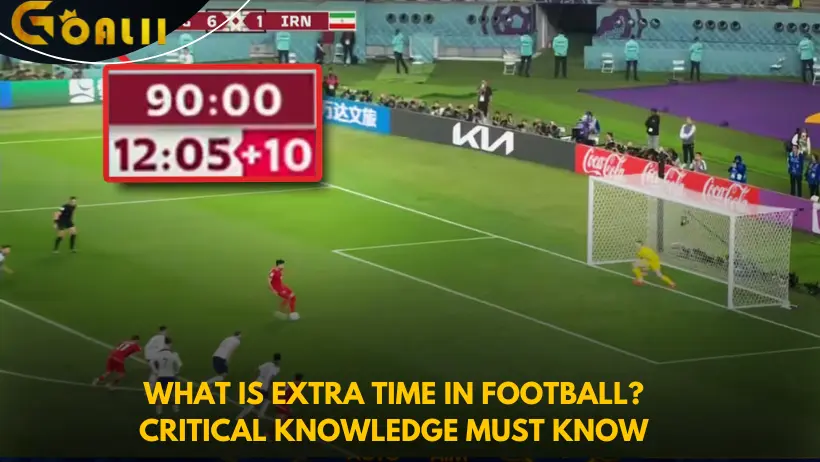What Is Extra Time in Football?
It doesn’t happen in every match, but when it does, the stakes are high, and the tension is palpable. Imagine two evenly matched teams battling it out, with neither able to break the deadlock after 90 minutes. In these nai-biting moments, that extra time adds a thrilling layer of excitement, where every second could bring a game-changing moment.
In this article, GOGOJILI will guide you through the intricacies of extra time, what it is, how it works, its history, and why it plays such a critical role in football.

What is extra time in soccer?
it is the period after a regular 90 minute play in which the match is level, and a winner must be found. Normally, this is employed in knockout stages or playoff games where a result must be decided.
It is added to create suspense and raise the stakes for both teams, making the game very intense. Extra time has seen many unexpected turns and thrilling moments as players push themselves to the limit bodily and mentally.
However, not every match involves extra time. It is only reserved for the most important ones that require a winner, such as finals or playoff rounds. The referee will declare extra time if the match finishes as a draw after 90 minutes. At this time, the player’s stamina is put to the test as both sides work harder to outshine their opponents and win under tremendous pressure.
Each half of extra time lasts 15 minutes; a second 15 minute period is played at the start, of which neither team has scored in the first half. If the score remains even after both halves, the game proceeds to a penalty shootout to determine the winner.
History and the First Match with Extra Time

Now that we have defined extra time let’s go into a bit more detail and present some history about it. Although none can really say precisely where it originated, the first recorded case of the time was included in 1897 in the rulebook of the English Football Association.
The first game that saw extra time was between Nurnberg and Hamburg during the German National Cup final. After 90 minutes, with a score of 2-2, a referee ordered a 10-minute extra time. With time, the rule kept evolving as the additional time became officially part of the game to avoid the contingent costs of scheduling rematches.
Critical Extra Time Rules of Football
Knowing the very basics of extra time involves knowing its rules. Not overly complicated, overtime is conducted according to FIFA in the following manner:
- When an applied referee can order extra time to determine a winner, in some cases, the eventual tie between teams occurs after the specified time of 90 minutes has expired during a knockout match.
- Who Kicks Off: The team that kicked off in regular time shall kick off the first half of the time.
- Side change: Teams change sides after the first 15-minute half to play the second half.
- Winning Criterion: The winner is declared to be the team that is the first to score one more goal than its opponent during the two 30-minute overtime periods; otherwise, the match will proceed with a penalty shootout.
- Substitution Rules: Teams can make one additional substitution at this time, which would amount to four substitutions if extra time is used.
Read more: Corner Betting Guide at GOGOJILI – The best Strategy From Experts
What is a golden goal in soccer?
A golden goal is a sudden-death variation of extra time, in which a match ends if a team scores in the time rather than the full 30 minutes.
The concept was introduced by FIFA for a number of international tournaments in 1993 and has been used in a number of notable cases. In the 1996 and 2000 UEFA European Championship finals, the golden goal decided the winner, with Oliver Bierhoff scoring for Germany in 1996 and David Trezeguet for France in 2000.
Although it provided a dramatic end to tense, closely-fought matches, the golden goal largely disappeared from professional soccer after 2003. In the two extra-time victories of the U.S. Women’s National Team at the 2024 Paris Olympics, the game continued after goals from Rodman and Smith.
Silver Goal Concepts
The concepts of Golden Goal and Silver Goal come in during extra time. FIFA employed two bizarre concepts at different times in the time: the golden goal and the silver goal.
Silver Goal – If one team was leading at the end of the first half of extra time, that team must be declared the winner to avoid playing the second period.
While these rules provided the drama of some fantastic endings, they were eventually abandoned in favor of the issue of perceived fairness.
New Premier League added time rules on 2024/25
Fans can expect shorter matches in the new Premier League season with a change to how injury time is determined.
With VAR decisions, up to 10 substitutions and an average of more than three goals per game last season, there was a lot of added time added each week.
But that’s about to change in the 2024/25 campaign, with referees now required to change how injury time is calculated after a goal.
Here, GOGOJILI breaks down the new rules.
New Premier League injury time rules.
The Premier League has changed how injury time is calculated. Last season, when a goal was scored, match officials would add on time before restarting.
But now, in this campaign, they won’t do that immediately. Instead, they will give teams 30 seconds to return to their playing positions and restart play before adding any time. 30 seconds is considered a natural amount of time for players to return to their positions and restart play.
Conclusion
Extra time injects an electrifying dimension into football, often producing moments simply memorable. Knowing the guidelines and history of extra time will help you appreciate the game, especially in those high-stakes matches where anything can happen. Don’t be without the action of extra time; that is where legends are made!

Hello everyone, I’m Maria Reyes, a betting expert with over 6 years of experience in the online casino world! I’m the CEO & Founder of GOGOJILI.COM, launched in February 2020, with a mission to bring exclusive promotions and top-notch thrills to Filipino players. Plus, we’re the official first-level agent site recognized by the GOGOJILI betting platform. A heartfelt thank you to all for your support, I’m thrilled to welcome you to our site!
